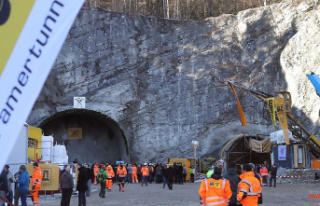Additional jobs and equalization of the burden: According to the union, an agreement was reached in the collective bargaining dispute about better working conditions for thousands of employees at the University Hospital in Frankfurt.
Frankfurt/Main (dpa/lhe) - In the week-long tariff dispute at the University Hospital in Frankfurt, there was an agreement on Tuesday. Verdi announced that the hospital board and the union had agreed on a collective agreement for the around 4,000 non-medical employees. It is about more staff and a binding burden compensation. At first no one could be reached from the employer side.
Verdie negotiator Georg Schulze spoke of a "milestone". "The brain drain from the nursing and healthcare professions can only be stopped if training is improved and loads are reliably limited," he said. Good care by enough staff also benefits the patients. After almost three years of work in the corona pandemic, the collective agreement is now setting the course in the right direction.
"We are pleased about this positive result, which means a real and noticeable relief for our employees," said Markus Jones, Commercial Director and Deputy Chairman of the Board of Directors of the University Hospital Frankfurt.
Specifically, according to the union, the parties agreed that from August 2023 there would be mandatory staffing in the nursing service in every shift and the right to additional days off for employees who have to work in understaffed shifts. In addition, an additional 70 positions in the non-nursing area were decided upon. Training should also be improved.
According to the university hospital, the core of the agreement is the introduction of a new system for personnel planning in nursing. With these instruments, the need for staff on each individual ward is determined according to how difficult and complex the care of the individual patients is. As a result, more nurses would be used in the station to care for patients in the future, it said. The committees on both sides now have to approve the collective bargaining agreement.
In the week-long collective bargaining conflict, the employer side and the union did not agree for weeks. There had been several rounds of negotiations and warning strikes.












